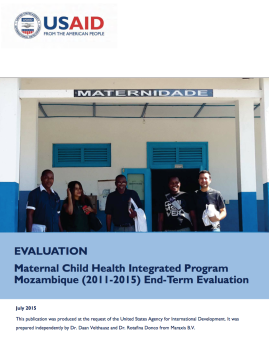The Maternal and Child Health Integrated Program (MCHIP) was implemented over the time-span of four years (April 2011-June 2015), its second phase in Mozambique. The program’s overall objective was to scaleup key Maternal, Neonatal and Child Health (MNCH) interventions through an integrated approach aligned with the government of Mozambique’s efforts to reduce maternal, neonatal and infant mortality.
This report captures the end-term evaluation assessment of MCHIP’s performance and its contribution to the integrated health results framework. The findings are an important cornerstone to inform potential strategies for future similar programs.
To achieve the program’s objectives, MCHIP assumed a humanized and women-centered methodology in the four program components: Enabling environment, Model Maternity Initiative (MMI), Family Planning (FP) and Cervical Cancer Program (CECAP). One hundred and fifty nine (159) health facilities of the country’s 1,300 facilities received specific Technical Assistance (TA) in the period of 2011 to 2015. The evaluation employed a mixed-method research design using both qualitative and quantitative methods: in-depth individual interviews were used to collect data from health staff and stakeholders, observations were made at health facilities and a survey instrument (questionnaire) using mobile technology was employed to collect demographic information from staff at health facilities. Statistics from the Health Management Information System (HMIS) were also used to quantify some findings.
The evaluation covered 25 health facilities across three provinces [Maputo (city and province), Nampula and Manica]. The evaluation was guided by eleven evaluation questions, focusing mainly on assessing the relevance, effectiveness, efficiency, impact and sustainability of the MCHIP intervention.


